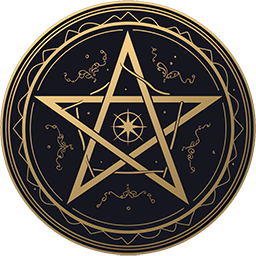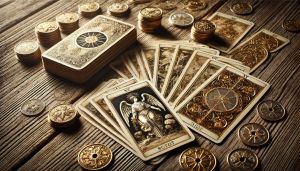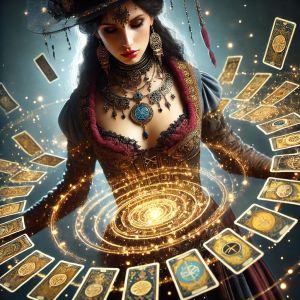Tarot
Tarot cards are a set of 78 cards, divided into two main groups: the Major Arcana and the Minor Arcana. Each card carries its own symbolism and meaning, offering insights into various aspects of life, emotions and spiritual paths. In this context, the cards are more then just symbolic; they are magical artifacts, each with the power to focus and amplify specific energies or aspects of existance. Tarot cards are thus not tools for divination, but potent magical instruments. Each card int he deck is linked to specific types of spells and magical effects, providing versatility for a skilled practicioner.
For practitioners of Tarot, the Tarot deck is a versatile tool, serving as a means of divination, a game, and a powerful instrument of magic. Whether providing insight into life’s mysteries, offering entertainment through gameplay, or channeling powerful energies, Tarot cards occupy a unique and multifaceted place in both mystical and everyday life.
Cards - Major Arcana
The Major Arcana consists of 22 cards, each representing significant, overreaching themes. The cards are often seen as keys to understanding profound spiritual lessons or major life events.
The Fool (Le Mat)
- Aspect: New beginnings, innocence.
- Magical Use: Generic spells related to air or travel, such as teleportation, wind-based spells or creating protective barriers.
The Magician (Le Bateleur)
- Aspect: Power, skill, ressourcefulness.
- Magical Use: Charms, particularly those that manipulate objects or energies (e.g. locomotion, levitation).
The High Priestess (La Papesse)
- Aspect: Intuition, mystery, the subconscious.
- Magical Use: Generic spells related to water and psychic abilities, such as scrying, mind reading, or creating illusions.
The Empress (L'Impératrice)
- Aspect: Fertility, creativity, abundance.
- Magical Use: Spells related to earth and nature, such as plant growth, healing, and nurturing life.
The Emperor (L'Empereur)
- Aspect: Authority, structure, control.
- Magical Use: Protective spells, wards, and charms that enforce order or strengthen defenses.
The Hierophant (La Pape)
- Aspect: Tradition, spiritual guidance.
- Magical Use: Spells and rituals related to spiritual protection, purification, and exorcism
The Lovers (L'Amoureux)
- Aspect: Relationships, choices, harmony.
- Magical Use: Spells related to emotional bonds, such as love charms, healing of relationships, or reconciliation.
The Chariot (Le Chariot)
- Aspect: Determination, willpower, triumph.
- Magical Use: Generic spells related to fire and force, such as fire manipulation, boosting speed or strength.
Strength (La Force)
- Aspect: Courage, persuasion, compassion.
- Magical Use: Spells that enhance physical and mental resilience or influence others.
The Hermit (L'Hermite)
- Aspect: Solitude, introspection, wisdom.
- Magical Use: Spells related to earth and shadow, such as invisibility, grounding, or self-reflection.
The Wheel of Fortune (La Roue de Fortune)
- Aspect: Cycles, fate, karma.
- Magical Use: Spells that alter probabilities, luck, or time.
Justice (La Justice)
- Aspect: Fairness, truth, law.
- Magical Use: Spells that reveal truth, enforce justice, or balance forces.
The Hanged Man (Le Pendu)
- Aspect: Suspension, letting go, new perspectives.
- Magical Use: Spells related to water and sacrifice, such as healing waters or stasis spells.
Death (L'Arcane sans Nom)
- Aspect: Transformation, endings, new beginnings.
- Magical Use: Transformation spells, particularly those involving major changes, both physical and spiritual.
Temperance (Tempérance)
- Aspect: Balance, moderation, harmony.
- Magical Use: Spells related to water and alchemy, such as potion-making, healing, and balancing energies.
The Devil (Le Diable)
- Aspect: Bondage, materialism, temptation.
- Magical Use: Curses and hexes that bind, tempt, or create dependencies.
The Tower (La Maison Dieu)
- Aspect: Upheaval, chaos, revelation.
- Magical Use: Destructive spells, particularly those that cause physical or magical disruption.
The Star (L'Étoile)
- Aspect: Hope, inspiration, spirituality.
- Magical Use: Spells related to air and light, such as illumination, guidance, or inspiration.
The Moon (La Lune)
- Aspect: Illusion, fear, the unconscious.
- Magical Use: Spells that create illusions, manipulate dreams, or invoke fear.
The Sun (La Soleil
- Aspect: Success, vitality, joy.
- Magical Use: Spells related to fire and light, such as healing light, energy boosts, or revealing hidden truths.
Judgement (Le Jugement)
- Aspect: Reflection, reckoning, absolution.
- Magical Use: Spells that judge, absolve, or reflect actions.
The World (Le Monde)
- Aspect: Completion, accomplishment, wholeness.
- Magical Use: Spells that complete cycles, unify forces, or bring closure.
Cards - Minor Arcana
The Minor Arcana consists of 56 cards, divided into four suits: Wands, Cups, Swords and Pentacles (or Talismans). Each suits contains 14 cards, 10 numbered carts and 4 court cards (Page, Knight, Queen, King). These cards deal with more every day matters and situations.
Wands (Bâtons)
Associated with action, creativity, and ambition
- Aspect: Insight into projects, careers, and personal drive.
- Elements: Fire, lightning
- Magical Use: Spells related to fire, lightning, energy and creativity.
Cups (Coupes)
Connected to emotions, relationships and intuition.
- Aspect: Insight into love, relationships, and emotional states.
- Elements: Water, light
- Magical Use: Spells related to water, light, emotions, and healing.
Swords (Épées)
Linked to intellect, conflict and truth.
- Aspect: Insight into challenges, decisions, and mental clarity.
- Elements: Air, darkness
- Magical Use: Spells related to air, darkness, intellect, and conflict.
Pentacles/Talismans/Coins (Deniers)
- Aspect: Insight into finances, health, and practical matters.
- Elements: Earth, spirit
- Magical Use: Spells related to earth, spirit, material wealth, and stability.
Tarot for Divination
While in the Mundane world, Tarot as a form of divination only emerged during the 18th century, they were used by Magi for similar purposes way longer. As magical artifacts, Tarot cards are used for divination by focussing on the specific aspects each card represents. Unlike traditional Tarot readings, where cards are drawn randomly to gain insight into a situation, the magical nature of these Tarot cards allows the reader to use specific cards as a focus to access deeper truth or hidden information.
The Process of Divination
- Selecting the Focus Card: The reader selects a card based on the question or situation they seek insight to. For example, if seeking insight into a relationship, the reader might focus on "The Lovers" card.
- Channeling the Card's Aspect: By concentrating on the card, the reader channels the card's inherent magical properties. This allows the reader to gain clarity on the issie at hand, such as understanding the motivations of others, uncovering hidden influences, or predicting possible outcomes (this is highly dependent on the FVF (Future Variable Flux) factor.
- Interpreting the Visions: The insights gained from the card are not always literal but are often symbolic, requiring the reader to interpret the visions or feelings evoked by the card. This interpretation is guided by the reader’s intuition and experience.
While Tarot cards can provide insights into past and present circumstances with great clarity, their use for predicting the future is less precise. The future is seen as fluid, with multiple possible outcomes influenced by free will and external factors. The amount of fluidity is called the Future Variable Flux (FVF) factor. For example, predicting the weather has a relatively low FVF factor, while predicting a person's actions typically has a high FVF factor. Therefore, Tarot is more commonly used for gaining understanding and guidance in the present rather than for forecasting future events.
More skilled practitioners can have clearer visions, however most users will have to interprete a lot, making predictions typically rather ambiguous and imprecise.
Tarot as a Game
Tarot as a Tool for Casting Magic
For those with the skill and knowledge, Tarot cards can be more than just tools for divination or games. They can be used as powerful magical tools for casting spells and manipulating energy. This form of magic is particularly common among the Roma, who have adapted Tarot cards as magic tools during the late 16th century, passed down the art of Tarot magic through generations.
The Art of Tarot Magic
- The Ritual Dance: A Tarot user often surrounds themselves with the cards, arranging them in patterns that correspond to the spell they wish to cast. The process is almost like a dance, with the user moving fluidly between the cards, activating their magical properties through gestures, incantations, and focused intent.
- Activating Cards: Each card, when activated, releases its stored magical energy. For instance, activating "The Magician" card might enhance the user’s own magical abilities, allowing them to perform more powerful spells. Activating "The Tower" could cause disruption or destruction in a controlled area, depending on the intent of the spell.
- Combining Cards: More complex spells might involve the use of multiple cards in combination. For example, a protection spell might involve activating "Strength" for resilience, "The Hierophant" for divine protection, and "The Empress" for nurturing energy. The combination of these cards would create a layered effect, protecting the user or a designated target from harm.
- The Role of Ancestry: Among the Roma, the ability to use Tarot cards for magic is often seen as a gift passed down through the bloodline. This connection to ancestry deepens the bond between the user and the cards, making their magic more potent.
Tarot magic is a highly specialized form of spellcasting, requiring both knowledge of the cards and a deep connection to the energies they represent. It is a rare and respected skill, with practitioners often seen as both wise counselors and powerful sorcerers.


